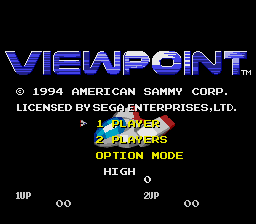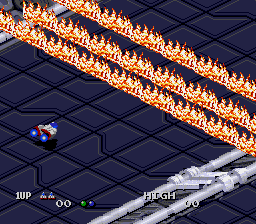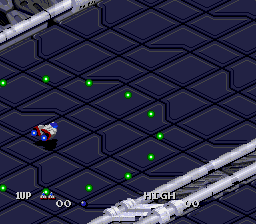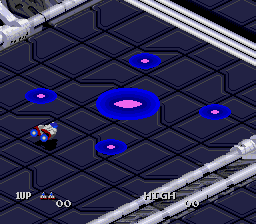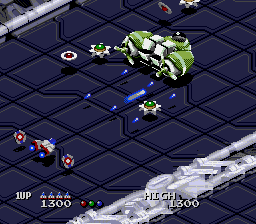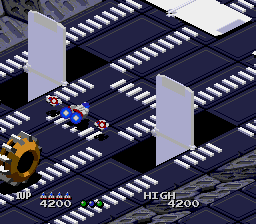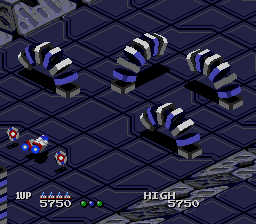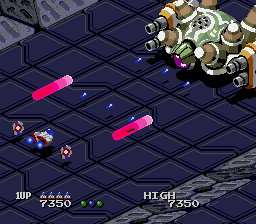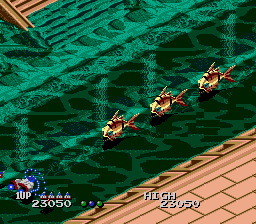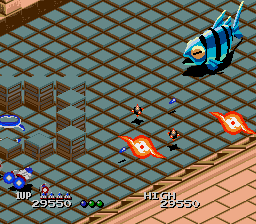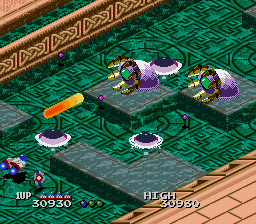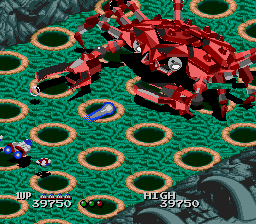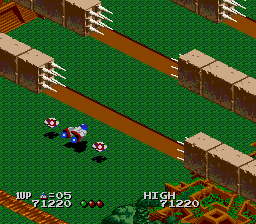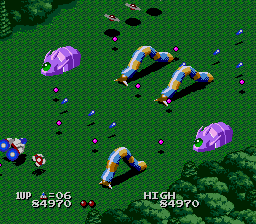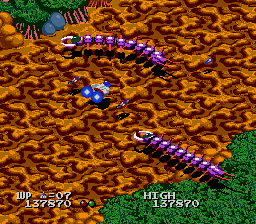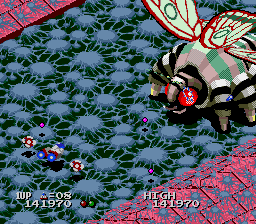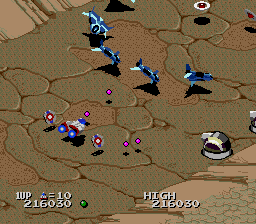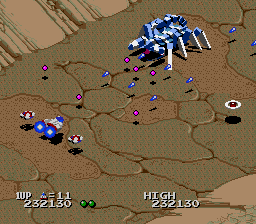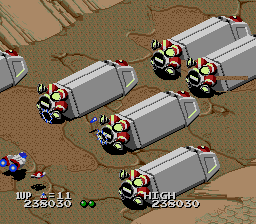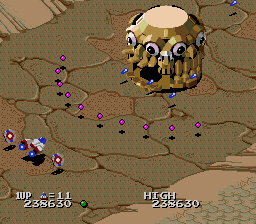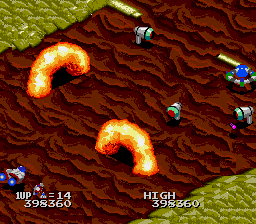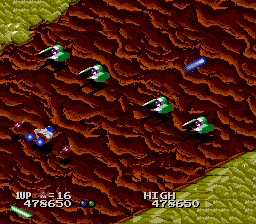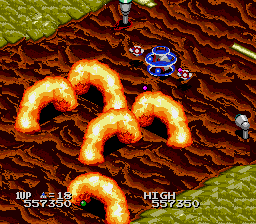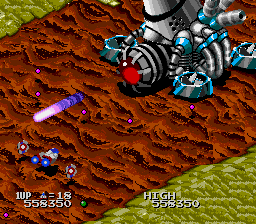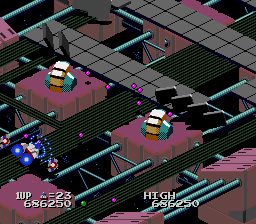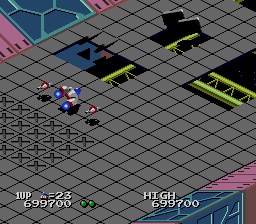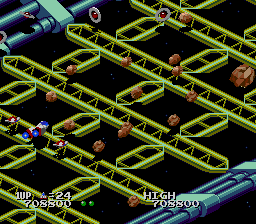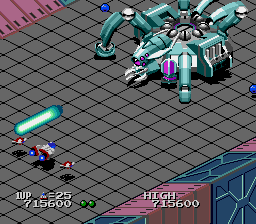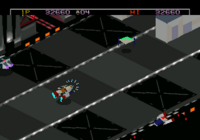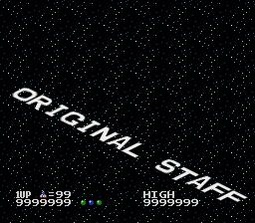Difference between revisions of "Viewpoint"
From Sega Retro
(→Legacy: screenshot) |
|||
| (74 intermediate revisions by 13 users not shown) | |||
| Line 1: | Line 1: | ||
| − | {{ | + | {{otherPage|desc=the unreleased [[Sega Saturn]] version|page=Viewpoint (Saturn)}} |
{{Bob | {{Bob | ||
| − | | bobscreen= | + | | bobscreen=Viewpoint MDTitleScreen.png |
| − | | publisher=[[Sammy]] | + | | publisher=[[American Sammy]]{{ref|http://gdri.smspower.org/wiki/index.php/Nexus_Interact}} |
| − | | developer=[[ | + | | developer=[[Nexus Interact]]{{ref|http://gdri.smspower.org/wiki/index.php/Nexus_Interact}} |
| system=[[Sega Mega Drive]] | | system=[[Sega Mega Drive]] | ||
| − | | | + | | sounddriver=[[SMPS Z80]] (banked) |
| − | | releases={{ | + | | peripherals= |
| − | | md_date_us=1994 | + | | players=1-2 |
| + | | genre=Shoot-'em-up | ||
| + | | originaldevelopers=[[Aicom]] | ||
| + | | originalsystem=Neo Geo MVS, Neo Geo AES | ||
| + | | releases={{releasesMD | ||
| + | | md_date_us=1994-11{{magref|egm|62|170}} | ||
| md_code_us=T-24096 | | md_code_us=T-24096 | ||
| + | | md_rating_us=ga | ||
}} | }} | ||
| − | | | + | | otherformats={{NonSega|Arcade|FMTOWNS|NG|NGCD|PS|X68}} |
| − | | | ||
}} | }} | ||
| − | ''''' | + | '''''{{PAGENAME}}''''' is a [[Sega Mega Drive]] shoot-'em-up game developed by [[Nexus Interact]]{{ref|http://gdri.smspower.org/wiki/index.php/Nexus_Interact}} and published by [[Sammy]].{{ref|http://gdri.smspower.org/wiki/index.php/Nexus_Interact}} A port of the titular 1992 [[Aicom]] arcade game ''[[wikipedia:Viewpoint (video game)|Viewpoint]]'', it was released exclusively in the United States in November 1994.{{magref|egm|62|170}} |
| + | |||
| + | The game uses an isometric perspective, similar to ''[[Zaxxon]]''. It has an eclectic soundtrack influenced by funk, hip-hop, jazz, and dance music. | ||
==Gameplay== | ==Gameplay== | ||
| − | The game takes place in a series of isometrically | + | The game is an autoscrolling shoot-'em-up that takes place in a series of isometrically projected corridors filled with enemies. The player controls a plane called the Byupo and can move around the screen freely using the D-Pad. The direction of movement is relative to the perspective of the player rather than the ship, so, for example, pressing {{up}} moves up on the screen rather than forward across the field. The play field is somewhat larger than the viewable area and pans over if the player tries to move past the left or right edge of the screen. |
| + | |||
| + | The Byupo has a standard weapon that shoots a single shot with {{B}}. There is no rapid-fire; instead, holding {{B}} charges the weapon for a stronger shot. The charged shot has three levels depending on how long it is charged and can penetrate multiple enemies in a line. If the player collects an Option item, the Byupo is accompanied by two satellite drones that augment its standard weapon with their own shots (though not the charged shot) and protect against some missile attacks. There are also special bombs that can be fired with {{A}} or {{C}}. There are three different types, and the Byupo can hold as many as three. Bombs are used from left to right, as displayed in the HUD. The player starts the game with a full complement of three bombs, one of each, and can collect more from item pick-ups throughout the stages. If the player already has three bombs and picks up another, the oldest of the existing bombs is replaced. | ||
| + | |||
| + | Like other shoot-'em-ups, stages are linear and involve fending off enemies as they stream in. However, there are relatively fewer enemies than other shooters and the game emphasizes slower-paced segments based around navigating through obstacles. There are hidden warp zones that allow the player to skip the rest of a stage. | ||
| + | |||
| + | The Byupo is destroyed if it is hit by an enemy or by enemy fire, though it is not harmed by touching walls. The player can continue from a predetermined checkpoint if there are extra lives remaining. Extra lives are granted when certain amounts of points are earned (50,000 points initially and then every 30,000 points after that) and can also be found as items. If the player loses a life with no more lives remaining, the game ends, but it can be continued from the start of the stage. | ||
| + | |||
| + | Before starting the game, the player can choose a difficulty level (Easy, Normal, and Hard) and how many lives to start with (3 or 5). The game also has a two-player mode where the players take turns (rather than playing simultaneously) with separate controllers. | ||
| + | |||
| + | ===Items=== | ||
| + | Items appear on the play field and can be collected by flying over them. They are sometimes contained in pods that must be destroyed to release them. | ||
| − | + | {{InfoTable|imagewidths=50| | |
| + | {{InfoRow | ||
| + | | title=Option | ||
| + | | sprite={{sprite | Viewpoint, Items.png | 2 | crop_width=16 | crop_height=16 | crop_x=48 | crop_y=16}} | ||
| + | | desc=Augments the Byupo with two drones that fire simultaneously with the ship's main weapon. Options are invulnerable and can also be used to ram enemies. | ||
| + | }} | ||
| + | {{InfoRow | ||
| + | | title=Barrier | ||
| + | | sprite={{sprite | Viewpoint, Items.png | 2 | crop_width=32 | crop_height=32 | crop_x=80 | crop_y=0}} | ||
| + | | desc=Surrounds the Byupo in a barrier that protects it from several enemy hits before disappearing. | ||
| + | }} | ||
| + | {{InfoRow | ||
| + | | title=Bonus | ||
| + | | sprite={{sprite | Viewpoint, Items.png | 2 | crop_width=16 | crop_height=16 | crop_x=48 | crop_y=0}} | ||
| + | | desc=Awards the player with bonus points. | ||
| + | }} | ||
| + | {{InfoRow | ||
| + | | title=1-Up | ||
| + | | sprite={{sprite | Viewpoint, Items.png | 2 | crop_width=16 | crop_height=16 | crop_x=64 | crop_y=0}} | ||
| + | | desc=Awards the player with an extra life. | ||
| + | }} | ||
| + | {{InfoRow | ||
| + | | title=Bomb | ||
| + | | sprite={{sprite | Viewpoint, Items.png | 2 | crop_width=48 | crop_height=16 | crop_x=0 | crop_y=16}} | ||
| + | | desc=Bombs contained in pods have a marble-like appearance. | ||
| + | }} | ||
| + | }} | ||
| − | == | + | ====Bombs==== |
| − | + | {{InfoTable|imagewidths=320| | |
| − | + | {{InfoRow | |
| − | + | | title={{sprite | Viewpoint, Items.png | crop_width=16 | crop_height=16 | crop_x=0}} Fire Bomb | |
| − | + | | screenshot=Viewpoint, Bombs, Fire.png | |
| − | + | | desc=Creates walls of fire in front of the ship that roll up the screen, destroying enemies and projectiles. | |
| − | + | }} | |
| − | + | {{InfoRow | |
| − | + | | title={{sprite | Viewpoint, Items.png | crop_width=16 | crop_height=16 | crop_x=16}} Homing Bomb | |
| − | + | | screenshot=Viewpoint, Bombs, Homing.png | |
| − | + | | desc=Shoots several missiles that home in on targets. This is the only bomb that cannot destroy enemy projectiles. | |
| − | + | }} | |
| + | {{InfoRow | ||
| + | | title={{sprite | Viewpoint, Items.png | crop_width=16 | crop_height=16 | crop_x=32}} Shockwave Bomb | ||
| + | | screenshot=Viewpoint, Bombs, Shockwave.png | ||
| + | | desc=Creates a circular, nova-like blast that destroys all enemies and projectiles caught in it. | ||
| + | }} | ||
| + | }} | ||
| − | == | + | ===Stages=== |
| − | {{ | + | {{InfoTable|imagewidths=320| |
| − | | | + | {{InfoRow |
| − | | | + | | title=Stage 1 |
| − | | | + | | screenshot=Viewpoint, Stage 1-1.png |
| − | | | + | | screenshot2=Viewpoint, Stage 1-2.png |
| − | | | + | | screenshot3=Viewpoint, Stage 1-3.png |
| + | | screenshot4=Viewpoint, Stage 1-4.png | ||
| + | | tabs=yes | ||
| + | | desc= | ||
}} | }} | ||
| + | {{InfoRow | ||
| + | | title=Stage 2 | ||
| + | | screenshot=Viewpoint, Stage 2-1.png | ||
| + | | screenshot2=Viewpoint, Stage 2-2.png | ||
| + | | screenshot3=Viewpoint, Stage 2-3.png | ||
| + | | screenshot4=Viewpoint, Stage 2-4.png | ||
| + | | tabs=yes | ||
| + | | desc= | ||
| + | }} | ||
| + | {{InfoRow | ||
| + | | title=Stage 3 | ||
| + | | screenshot=Viewpoint, Stage 3-1.png | ||
| + | | screenshot2=Viewpoint, Stage 3-2.png | ||
| + | | screenshot3=Viewpoint, Stage 3-3.png | ||
| + | | screenshot4=Viewpoint, Stage 3-4.png | ||
| + | | tabs=yes | ||
| + | | desc= | ||
| + | }} | ||
| + | {{InfoRow | ||
| + | | title=Stage 4 | ||
| + | | screenshot=Viewpoint, Stage 4-1.png | ||
| + | | screenshot2=Viewpoint, Stage 4-2.png | ||
| + | | screenshot3=Viewpoint, Stage 4-3.png | ||
| + | | screenshot4=Viewpoint, Stage 4-4.png | ||
| + | | tabs=yes | ||
| + | | desc= | ||
| + | }} | ||
| + | {{InfoRow | ||
| + | | title=Stage 5 | ||
| + | | screenshot=Viewpoint, Stage 5-1.png | ||
| + | | screenshot2=Viewpoint, Stage 5-2.png | ||
| + | | screenshot3=Viewpoint, Stage 5-3.png | ||
| + | | screenshot4=Viewpoint, Stage 5-4.png | ||
| + | | tabs=yes | ||
| + | | desc=The player faces the bosses of the previous stages in addition to a new boss, interspersed with sections of fire worms and turrets. | ||
| + | }} | ||
| + | {{InfoRow | ||
| + | | title=Stage 6 | ||
| + | | screenshot=Viewpoint, Stage 6-1.png | ||
| + | | screenshot2=Viewpoint, Stage 6-2.png | ||
| + | | screenshot3=Viewpoint, Stage 6-3.png | ||
| + | | screenshot4=Viewpoint, Stage 6-4.png | ||
| + | | tabs=yes | ||
| + | | desc= | ||
| + | }} | ||
| + | }} | ||
| + | |||
| + | ==History== | ||
| + | ===Legacy=== | ||
| + | {{ScreenThumb|Zaxxon's Motherbase 2000, Byupo.png|width=200|''[[Zaxxon's Motherbase 2000]]''}} | ||
| + | A sequel called ''Viewpoint 2064'' was in development for the [[Nintendo 64]] but never released.{{ref|https://hiddenpalace.org/Viewpoint_2064_(Prototype)}}{{ref|https://lostmediawiki.com/Viewpoint_2064_(found_build_of_unreleased_Nintendo_64_shoot_%27em_up_game;_1999)}} | ||
| + | |||
| + | An enemy ship resembling the Byupo and having a similar charged shot appears in the isometric shoot-'em-up ''[[Zaxxon's Motherbase 2000]]'' for the [[Sega 32X]].{{fileref|Zaxxon's Motherbase 2000, Byupo.png}} It can be taken over and controlled by the player. | ||
| + | |||
| + | The game was included in the [[Mega Drive Mini 2]] in 2022. This is the first official release of the Mega Drive port of the game in Japan and Europe. | ||
| + | |||
| + | ==Production credits== | ||
| + | {{multicol| | ||
| + | {{creditstable| | ||
| + | {{creditsheader|Original Staff}} | ||
| + | *'''Game Design:''' Nenko, Morii, Terasaka, Mokichi, Akahoushi, Run | ||
| + | *'''Program:''' S.Kinjo, M.Tani | ||
| + | *'''Sound:''' Sizlla, Masaki Kase, Megumi M. | ||
| + | *'''Polygonizer:''' N.Yamaguchi | ||
| + | *'''Graphic:''' Ashin, H.Takeuchi, Yuri Tomura, Maxma, Miyaki, Ken Katoku, Chirico | ||
| + | *'''BG:''' H.T, K.Nishithuka | ||
| + | *'''Special Thanks:''' Ueno, Nao Yuki, Wakker, Takano, S.Sato, Asc | ||
| + | {{creditsheader|Genesis Staff}} | ||
| + | *'''[[Nexus Interact]]:''' Emuta, Chikako.K, M.Asakawa, Fukurou, Hyoh.A, Nashi, Kani | ||
| + | *'''Genesis Producer:''' Kiyoshi Fujii | ||
| + | | source=In-game credits | ||
| + | | pdf=Viewpoint MD credits.pdf | ||
| + | | console=MD | ||
| + | }} | ||
| + | }} | ||
| + | |||
| + | ==Digital manuals== | ||
| + | <gallery> | ||
| + | Viewpoint MD US MDMini2 manual.pdf|Mega Drive Mini 2 US manual | ||
| + | Viewpoint MD EU MDMini2 manual.pdf|Mega Drive Mini 2 EU manual | ||
| + | Viewpoint MD JP MDMini2 manual.pdf|Mega Drive Mini 2 JP manual | ||
| + | </gallery> | ||
| + | |||
| + | ==Magazine articles== | ||
| + | {{mainArticle|{{PAGENAME}}/Magazine articles}} | ||
| + | |||
| + | ==Promotional material== | ||
| + | {{gallery | ||
| + | |{{GalleryPrintAd | ||
| + | |text=Mega Drive print advert | ||
| + | |egm2|1|69 | ||
| + | }} | ||
| + | |{{GalleryPrintAd | ||
| + | |text=Mega Drive print advert | ||
| + | |gamepro|64|121 | ||
| + | |egm2|5|83 | ||
| + | |egm|65|59 | ||
| + | |sv|22|107 | ||
| + | |gamepro|66|37 | ||
| + | }} | ||
| + | |{{GalleryPrintAd | ||
| + | |text=Saturn print advert | ||
| + | |egm|77|166-167 | ||
| + | |tat|11|20 | ||
| + | }} | ||
| + | }} | ||
| + | |||
| + | ==Physical scans== | ||
| + | {{ratings|MD}} | ||
{{Scanbox | {{Scanbox | ||
| console=Mega Drive | | console=Mega Drive | ||
| region=US | | region=US | ||
| front=ViewPoint MD US Box.jpg | | front=ViewPoint MD US Box.jpg | ||
| − | | cart= | + | | back=ViewPoint MD US Box Back.jpg |
| + | | spinemissing=yes | ||
| + | | cart=Viewpoint MD US Cart.jpg | ||
| + | | manual=Viewpoint md us manual.pdf | ||
}} | }} | ||
| − | [[Category: | + | |
| + | ==Technical information== | ||
| + | {{mainArticle|{{PAGENAME}}/Technical information}} | ||
| + | |||
| + | ==References== | ||
| + | <references/> | ||
| + | |||
| + | {{ViewpointOmni}} | ||
| + | [[Category:Mega Drive Mini 2 games]] | ||
Latest revision as of 10:04, 30 September 2023
- For the unreleased Sega Saturn version, see Viewpoint (Saturn).
| Viewpoint | ||||||||||
|---|---|---|---|---|---|---|---|---|---|---|
| System(s): Sega Mega Drive | ||||||||||
| Publisher: American Sammy[1] | ||||||||||
| Developer: Nexus Interact[1] | ||||||||||
| Original system(s): Neo Geo MVS, Neo Geo AES | ||||||||||
| Developer(s) of original games: Aicom | ||||||||||
| Sound driver: SMPS Z80 (banked) | ||||||||||
| Genre: Shoot-'em-up | ||||||||||
| Number of players: 1-2 | ||||||||||
| ||||||||||
|
Viewpoint is a Sega Mega Drive shoot-'em-up game developed by Nexus Interact[1] and published by Sammy.[1] A port of the titular 1992 Aicom arcade game Viewpoint, it was released exclusively in the United States in November 1994.[2]
The game uses an isometric perspective, similar to Zaxxon. It has an eclectic soundtrack influenced by funk, hip-hop, jazz, and dance music.
Contents
Gameplay
The game is an autoscrolling shoot-'em-up that takes place in a series of isometrically projected corridors filled with enemies. The player controls a plane called the Byupo and can move around the screen freely using the D-Pad. The direction of movement is relative to the perspective of the player rather than the ship, so, for example, pressing ![]() moves up on the screen rather than forward across the field. The play field is somewhat larger than the viewable area and pans over if the player tries to move past the left or right edge of the screen.
moves up on the screen rather than forward across the field. The play field is somewhat larger than the viewable area and pans over if the player tries to move past the left or right edge of the screen.
The Byupo has a standard weapon that shoots a single shot with ![]() . There is no rapid-fire; instead, holding
. There is no rapid-fire; instead, holding ![]() charges the weapon for a stronger shot. The charged shot has three levels depending on how long it is charged and can penetrate multiple enemies in a line. If the player collects an Option item, the Byupo is accompanied by two satellite drones that augment its standard weapon with their own shots (though not the charged shot) and protect against some missile attacks. There are also special bombs that can be fired with
charges the weapon for a stronger shot. The charged shot has three levels depending on how long it is charged and can penetrate multiple enemies in a line. If the player collects an Option item, the Byupo is accompanied by two satellite drones that augment its standard weapon with their own shots (though not the charged shot) and protect against some missile attacks. There are also special bombs that can be fired with ![]() or
or ![]() . There are three different types, and the Byupo can hold as many as three. Bombs are used from left to right, as displayed in the HUD. The player starts the game with a full complement of three bombs, one of each, and can collect more from item pick-ups throughout the stages. If the player already has three bombs and picks up another, the oldest of the existing bombs is replaced.
. There are three different types, and the Byupo can hold as many as three. Bombs are used from left to right, as displayed in the HUD. The player starts the game with a full complement of three bombs, one of each, and can collect more from item pick-ups throughout the stages. If the player already has three bombs and picks up another, the oldest of the existing bombs is replaced.
Like other shoot-'em-ups, stages are linear and involve fending off enemies as they stream in. However, there are relatively fewer enemies than other shooters and the game emphasizes slower-paced segments based around navigating through obstacles. There are hidden warp zones that allow the player to skip the rest of a stage.
The Byupo is destroyed if it is hit by an enemy or by enemy fire, though it is not harmed by touching walls. The player can continue from a predetermined checkpoint if there are extra lives remaining. Extra lives are granted when certain amounts of points are earned (50,000 points initially and then every 30,000 points after that) and can also be found as items. If the player loses a life with no more lives remaining, the game ends, but it can be continued from the start of the stage.
Before starting the game, the player can choose a difficulty level (Easy, Normal, and Hard) and how many lives to start with (3 or 5). The game also has a two-player mode where the players take turns (rather than playing simultaneously) with separate controllers.
Items
Items appear on the play field and can be collected by flying over them. They are sometimes contained in pods that must be destroyed to release them.
| Option | |
|---|---|
| Augments the Byupo with two drones that fire simultaneously with the ship's main weapon. Options are invulnerable and can also be used to ram enemies. | |
| Barrier | |
| Surrounds the Byupo in a barrier that protects it from several enemy hits before disappearing. | |
| Bonus | |
| Awards the player with bonus points. | |
| 1-Up | |
| Awards the player with an extra life. | |
| Bomb | |
| Bombs contained in pods have a marble-like appearance. |
Bombs
| Fire Bomb | |
|---|---|
| Creates walls of fire in front of the ship that roll up the screen, destroying enemies and projectiles. | |
| Homing Bomb | |
| Shoots several missiles that home in on targets. This is the only bomb that cannot destroy enemy projectiles. | |
| Shockwave Bomb | |
| Creates a circular, nova-like blast that destroys all enemies and projectiles caught in it. |
Stages
| Stage 1 | |
|---|---|
| Stage 2 | |
| Stage 3 | |
| Stage 4 | |
| Stage 5 | |
| The player faces the bosses of the previous stages in addition to a new boss, interspersed with sections of fire worms and turrets. | |
| Stage 6 | |
History
Legacy
A sequel called Viewpoint 2064 was in development for the Nintendo 64 but never released.[3][4]
An enemy ship resembling the Byupo and having a similar charged shot appears in the isometric shoot-'em-up Zaxxon's Motherbase 2000 for the Sega 32X.[5] It can be taken over and controlled by the player.
The game was included in the Mega Drive Mini 2 in 2022. This is the first official release of the Mega Drive port of the game in Japan and Europe.
Production credits
- Game Design: Nenko, Morii, Terasaka, Mokichi, Akahoushi, Run
- Program: S.Kinjo, M.Tani
- Sound: Sizlla, Masaki Kase, Megumi M.
- Polygonizer: N.Yamaguchi
- Graphic: Ashin, H.Takeuchi, Yuri Tomura, Maxma, Miyaki, Ken Katoku, Chirico
- BG: H.T, K.Nishithuka
- Special Thanks: Ueno, Nao Yuki, Wakker, Takano, S.Sato, Asc
- Nexus Interact: Emuta, Chikako.K, M.Asakawa, Fukurou, Hyoh.A, Nashi, Kani
- Genesis Producer: Kiyoshi Fujii
Digital manuals
Magazine articles
- Main article: Viewpoint/Magazine articles.
Promotional material
also published in:
- EGM² (US) #5: "November 1994" (1994-1x-xx)[7]
- Electronic Gaming Monthly (US) #65: "December 1994" (1994-xx-xx)[8]
- Sega Visions (US) #22: "December/January 1994/1995" (1994-xx-xx)[9]
- GamePro (US) #66: "January 1995" (199x-xx-xx)[10]
also published in:
- Tips & Tricks (US) #11: "Volume III, Issue 1: January 1996" (199x-xx-xx)[11]
Physical scans
| Sega Retro Average | ||||||||||||||||||||||||||||||||||||||||||||||||||||||||||||||||||||||||||
|---|---|---|---|---|---|---|---|---|---|---|---|---|---|---|---|---|---|---|---|---|---|---|---|---|---|---|---|---|---|---|---|---|---|---|---|---|---|---|---|---|---|---|---|---|---|---|---|---|---|---|---|---|---|---|---|---|---|---|---|---|---|---|---|---|---|---|---|---|---|---|---|---|---|---|
|
| 70 | |
|---|---|
| Based on 14 reviews | |
Technical information
- Main article: Viewpoint/Technical information.
References
- ↑ 1.0 1.1 1.2 1.3 http://gdri.smspower.org/wiki/index.php/Nexus_Interact
- ↑ 2.0 2.1 Electronic Gaming Monthly, "September 1994" (US; 1994-xx-xx), page 170
- ↑ https://lostmediawiki.com/Viewpoint_2064_(found_build_of_unreleased_Nintendo_64_shoot_%27em_up_game;_1999)
- ↑ File:Zaxxon's Motherbase 2000, Byupo.png
- ↑ File:Viewpoint MD credits.pdf
- ↑ EGM², "November 1994" (US; 1994-1x-xx), page 83
- ↑ Electronic Gaming Monthly, "December 1994" (US; 1994-xx-xx), page 59
- ↑ Sega Visions, "December/January 1994/1995" (US; 1994-xx-xx), page 107
- ↑ GamePro, "January 1995" (US; 199x-xx-xx), page 37
- ↑ Tips & Tricks, "Volume III, Issue 1: January 1996" (US; 199x-xx-xx), page 20
- ↑ 1700 igr dlya Sega, "" (RU; 2001-xx-xx), page 257
- ↑ Consoles +, "Avril 1995" (FR; 1995-0x-xx), page 94
- ↑ Computer + Video Giochi, "Gennaio 1995" (IT; 199x-xx-xx), page 106
- ↑ Electronic Gaming Monthly, "December 1994" (US; 1994-xx-xx), page 42
- ↑ GameFan, "Volume 2, Issue 12: December 1994" (US; 1994-xx-xx), page 26
- ↑ GamePro, "December 1994" (US; 1994-xx-xx), page 126
- ↑ Game Informer, "January 1995" (US; 199x-xx-xx), page 18
- ↑ Joypad, "Avril 1995" (FR; 1995-0x-xx), page 88
- ↑ MAN!AC, "02/95" (DE; 1995-01-11), page 40
- ↑ Mega Fun, "04/95" (DE; 1995-03-22), page 81
- ↑ Next Generation, "March 1995" (US; 1995-02-21), page 104
- ↑ Sega Power, "January 1995" (UK; 1994-11-17), page 72
- ↑ Tricks 16 bit, "Tricks Sega Gold 800 igr" (RU; 1998-03-20), page 217
- ↑ Video Games, "4/95" (DE; 1995-03-22), page 95
| Viewpoint | |
|---|---|
|
Main page | Comparisons | Maps | Magazine articles | Reception | Region coding | Technical information
Prototypes: 1994-07-22
| |
